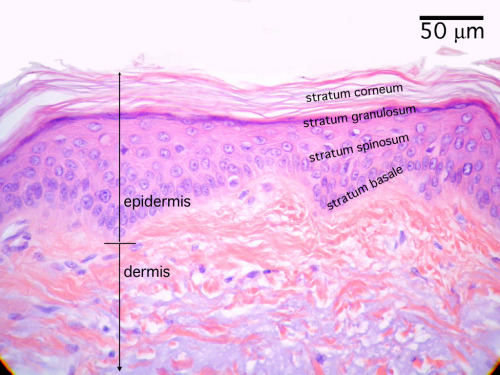Anatomy & Physiology: The Integumentary System
-makes up 16% of your body weight
-composed of the cutaneous membrane & accessory organs
Integument

1. Epidermis
2.Dermis
What are the 2 components of the cutaneous membrane?

-superficial epithelium
-stratified squamous epithelium
-avascular
-contains keratinocytes
Epidermis

-underlying area of connective tissue
Dermis

-hair, exocrine glands, and nails
-primarily located in the dermis and protrudes through the epidermis to the skin surface
Accessory Structures

-aka superficial fascia or subcutaneous layer
-separates the integument from the deep fascia around other organs
Hypodermis
-protection of underlying tissues & organs
-excretion of salts, water, and organic wastes
-maintenance of normal body temperature
-production of melanin
-production of keratin
-synthesis of vitamin D
-storage of lipids
- detection of touch, pressure, pain, vibration, and temperature stimuli
-coordination & immune response
Functions of the Integumentary System

1.Stratum Corneum
2.Stratum Granulosum
3.Stratum Spinosum
4.Stratum Basale
4 layers of thin skin

1.Stratum Corneum
2.Stratum Lucidum
3.Stratum Granulosum
4.Stratum Spinosum
5.Stratum Basale
5 Layers of thick skin
-aka stratum germinativum
-the deepest layer of the epidermis
-attachment to the basement membrane
-forms epidermal ridges
-contains basal cells, melanocytes, and tactile cells (Merkel cells)
Stratum Basale
-cells that divide to replace the more superficial keratinocytes that are shed at the epithelial surface
Basal Cells

-consists of 8-10 layers of keratinocytes bound together by desmosomes
-contains dendritic cells
Stratum Spinosum "Spiny Layer"

-aka Langerhans cells
- cells that participate in the immune response
-branching projections
Dendritic Cells
%20stratification.jpg)
-consists of 3-5 layers of keratinocytes
-produces large amounts of keratin & keratohyalin
Stratum Granulosum "Grainy Layer"
-A tough, fibrous protein
-the basic component of hair & nails in humans
Keratin

-only in thick skin
-cells are flattened, densely packed without organelles, and filled with keratin
Stratum Lucidum "Clear Layer"

-exposed surface
-contains 15-30 layers of keratinized cells
-water resistant (NOT WATERPROOF)
Stratum Corneum
-the formation of protective, superficial layers of cells filled with keratin
-takes place on all exposed skin surface, except the anterior surfaces of the eyes
Keratinization

Around 7-10 days
How long does it take for a cell to move from the Stratum Basale to the Stratum Corneum?
-water from interstitial fluids slowly penetrates to the surface and evaporates into the air
-you are unable to see or feel this water loss
Insensible Perspiration
-produced by active sweat glands
-you are aware of this water loss
Sensible Perspiration
Carotene and Melanin
What are the two pigments found in the epidermis?
An orange-yellow pigment that normally accumulates in epidermal cells
-most apparent in the cells of the stratum corneum of light skinned individuals
Carotene

pigment produced by the melanocytes
1.Pheomelanin (red-yellow form)
2.Eumelanin (brown-black form)
Melanin

-manufacture both types of melanin from the amino acid tyrosine and packages it into intracellular vesicles called melanosomes
Melanocytes
melanin
The __________ in keratinocytes protects your epidermis and dermis from the harmful effects of sunlight, which contains significant amounts of ultraviolet radiation (UV).
hemoglobin
Blood contains red blood cells filled with the pigment ___________, which binds and transports oxygen in the bloodstream.
when the skins turns blue
-occurs in response to extreme cold or results of cardiovascular or respiratory issues
Cyanosis